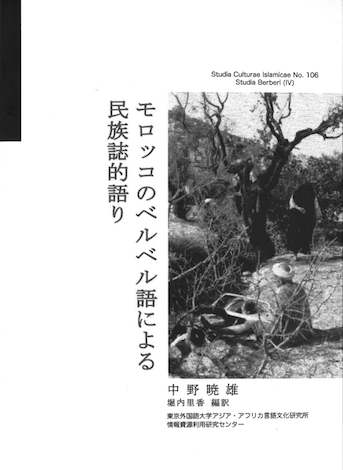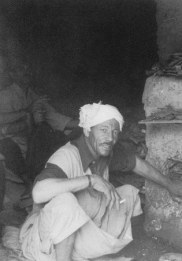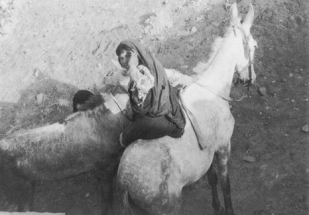2025/03/12
Building an online digital resource based on the Swahili dictionary published from ILCAA
2017/12/13

IRC Published “Ethnographical texts in Moroccan Berber” authored by Akio NAKANO, edited and translated by Rika HORIUCHI.
The below are the contents. We will be fascinated by this book in which various narratives in accordance with each topic : “Now, I will talk to you in the tongue of Shilha brothers. Our village is…”
Studia Culturae Islamicae No. 106 Studia Berberi (IV)
ISBN 978-4-86337-257-3
Size: B5 xx+ 243 pages
Publication 2017.10
Publisher:ILCAA
Producer: IRC
Project for 2017 “Digitization and Publication of Japanese Translation of ‘Studia Berberi’ written by Akio NAKANO”
Please refer to the below for a request of the book
http://www.aa.tufs.ac.jp/ja/publications/inquiry
This page provides a message “On the publication of this book” from Jun’ichi ODA, IRC staff who participated in the publication and posts a text titled “Message for the publication of ‘Ethnographical texts in Moroccan Berber,’” including the background of the publication, the academic meaning of original text, the meaning of Japanese translation, and glossary with 1200 words organized by the translator, Rika HORIUCHI.
Author: Jun’ichi ODA (ILCAA)
As the background of the publication of this translated book is also mentioned in the book, translated “Preface”, given by Ms. Rika Horiuchi, was so long and rich in content that it was comparable to a thesis. The body of translated three-volume texts was so voluminous that I was forced to request her to omit considerable parts from the book for various reasons such as the structures of similar ILCAA publications. I also tried to summarize the background of my participation in the publication in one page, but I gave up writing the introduction because over five pages was required to reach the essence of the background. I asked myself a question about why I gave up it, and I guess that the great work and mysterious character of Prof. Nakano caused it.

I feel various fates regarding the publication of this book. The last volume of the original texts was published in 1997, the year of establishment of Information Resources Center (IRC), and the first book that IRC celebrating its 20th anniversary published as a “paper-based” book. Mr. Masaki Horiuchi who proposed this project is a senior with whom I maybe spent the longest time in various fieldwork, workshops, and parties. Prof. H, who accepted a thesis of Ms. Rika Horiuchi, the translator, on Berber language in spite of her major in French literature, used to be a young leader in a reading club for Medieval French where I have been with him 40 years ago. Shortly before the passing of Prof. Nakano, I saw him by chance in a missionary snack bar managed by a Jesuit priest in Kabuki-cho. Prof. Nakano ordered a bottle of red wine and drank it up in slowly reading a weekly magazine. During an exceptionally strong handshake, I saw Prof. Nakano made a little different smile. This seems to me that he already predicted I would be related to this book, and it is not a far-fetched idea. It is possible that Prof. Nakano had learned an Arab divination created by a practitioner of Sufism in Marrakesh.

When I was requested to write an introduction of this book on the website of IRC, I requested that Ms. Rika Horiuchi would also provide one, then she sent two versions: short one and long one. As I said before, the short version was adopted to the “Preface” of this book, but I would like to use this opportunity to provide the long-version introduction on the web without any volume limitations.
“Message for the publication of ‘Ethnographical texts in Moroccan Berber,’” (PDF 3.1 MB)